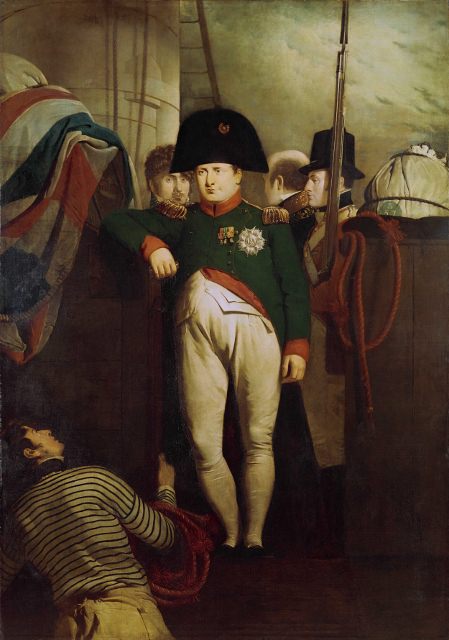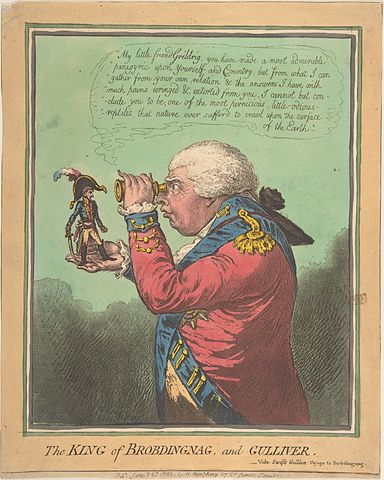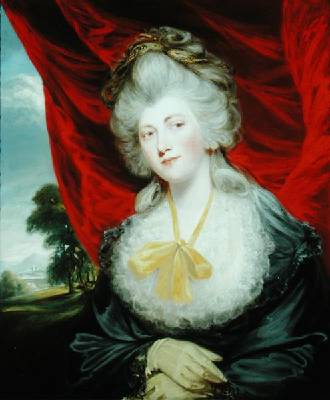We would very much like to welcome our latest guest, Shannon Selin who has so very kindly offered to write an article about Napoleon and the Prince Regent for us. Shannon is the author of Napoleon in America, which imagines what might have happened if Napoleon had escaped from St. Helena and wound up in the United States in 1821. She blogs about Napoleonic and 19th century history at shannonselin.com. Shannon’s book is available from Amazon in paperback or from Amazon as an E-book by clicking on the links.
There has recently been publicity about the letter Napoleon Bonaparte wrote to King George IV (then the Prince Regent) requesting asylum in England after his 1815 abdication from the throne of France. The letter, which is on display at Windsor Castle as part of the commemoration of the 200th anniversary of the Battle of Waterloo, reads:
“Royal Highness, Prey to the factions which divide my country, and to the enmity of the greatest powers of Europe, I have terminated my political career, and I come, like Themistocles, to seat myself at the hearth of the British people. I put myself under the protection of their laws, which I claim from your Royal Highness, as the most powerful, the most constant, and the most generous of my enemies. Rochefort, 13 July 1815. Napoleon.”
Before writing this, Napoleon said to his advisors, “I am not acquainted with the Prince Regent; but from all I have heard of him I cannot avoid placing reliance on his noble character.” According to Lord Holland, on reading the letter the Prince Regent reportedly said, “Upon my word, a very proper letter: much more so, I must say, than any I ever received from Louis XVIII.” These words are surprising in the context of Prinny’s general view of Napoleon. Member of Parliament Samuel Whitbread wrote in April 1814: “I hear [the Regent] says I am the worst man God Almighty every formed, except Bonaparte….”
The Prince Regent detested Napoleon and was a great supporter of France’s Bourbon monarchy. During Napoleon’s reign, he provided refuge in the UK for Louis XVIII and his family. Prinny openly advocated the return of the Bourbons to power, in contrast with the more cautious approach taken by his cabinet. Britain’s foreign minister, Lord Castlereagh, feared that Britain’s European allies would regard British patronage of the Bourbons as an attempt to scuttle the 1814 peace negotiations with Napoleon. To get around this, the Prince Regent made a personal overture to Russia’s Tsar Alexander, through Russian ambassador Prince Lieven, entreating him to dethrone Napoleon.

Not surprisingly, Napoleon’s 1815 request for British asylum was refused. Napoleon was instead exiled to the island of St. Helena, where he remained until his death in 1821. For a while Napoleon continued to harbour illusions that Prinny had no particular dislike of him. He blamed his exile on those surrounding the Prince. He told British Admiral Pulteney Malcolm that “if old George [III] were well he would have been better treated, he was not so much in the hands of his ministers as the Regent; besides, he would have seen the bad consequences to royalty of debasing a person who had once worn a crown by the choice of a nation. The Regent should remember the flattering messages he sent to him at the Peace of Amiens.”
Napoleon considered writing to Prince George from exile. When he learned that the letter would be opened and read by British officials before it was delivered, he decided not to, considering that inconsistent with both his and the Regent’s dignity.
Napoleon was not entirely unaware of Prinny’s true character. Pressing Admiral Malcolm for details about English drinking habits, Napoleon said, “It was the fashion when the Prince Regent was young. I have been told he sometimes sat at table till he fell off his chair; was it not so?”
Napoleon also thought it strange that the Prince Regent should choose as his mistress the Marchioness of Hertford, a lady who was over fifty and already a grandmother. “It appears that you like old women in England.”
The longer Napoleon sat pondering his fate, the more it dawned on him that the Prince Regent might not be his advocate. He told his companion General Gourgaud, “When Louis XVIII dies, great events may take place; and if Lord Holland should then be Prime Minister of England, they may bring me back to Europe. But what I most hope for is the death of the Prince Regent, which will place the young Princess Charlotte on the English throne. She will bring me back to Europe.”
In the end, Napoleon was probably not far off thinking the thoughts the caricaturist George Cruikshank puts in his mouth as he addresses Prinny, the “Sun”: “To thee I call— But with no friendly voice, & add thy name—G—P—Rt!. to tell thee how I hate thy beams, that bring to my remembrance from what state I fell &c.”





